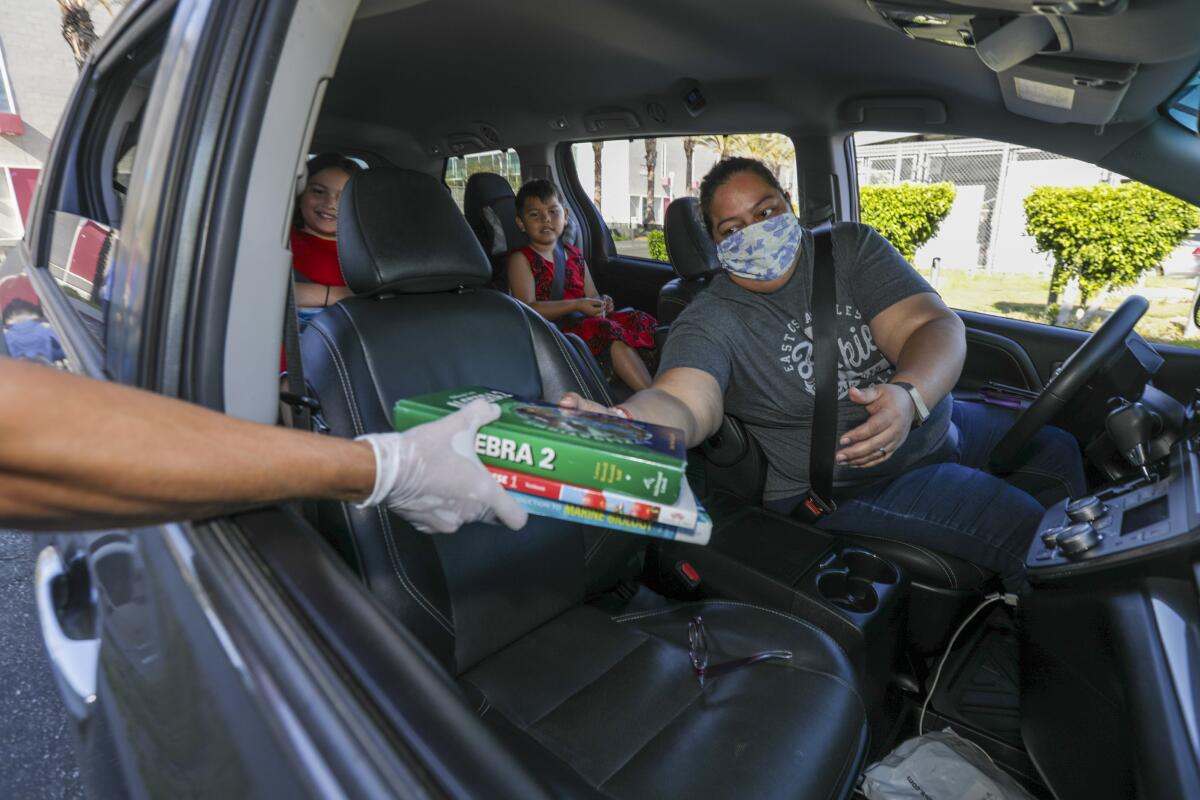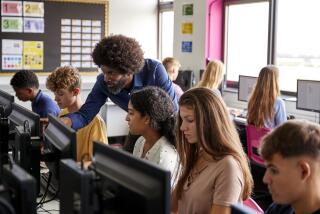California is failing to provide free and equal education to all during pandemic, suit alleges

- Share via
The state of California has failed during the COVID-19 pandemic to provide a free and equal education to all students, violating the state Constitution and discriminating against Black, Latino and low-income families, according to a lawsuit filed Monday.
These children have been left behind during months of distance learning, lacking access to digital tools as well as badly needed academic and social-emotional supports, according to the lawsuit filed by the Public Counsel on behalf of California students, parents and several community organizations.
The suit also alleges that students have been harmed by schools that fail to meet required minimum instructional times and to provide adequate training and support to teachers.
“The State’s abdication of responsibility and insufficient response to the challenges of remote learning have denied Plaintiffs the basic educational equality guaranteed to them by the California Constitution,” the complaint said. “Because the State’s pandemic response compels families to use their homes as classrooms, the State’s constitutional obligations expand into the home.”
The lawsuit, filed in Alameda County Superior Court, names as defendants the state, Department of Education, Board of Education and state Supt. of Instruction Tony Thurmond.
Jesse Melgar, a spokesman for the governor, said in a statement: “Throughout the pandemic this administration has taken important actions to protect student learning while also taking necessary steps to protect public health. We will defend our position in court.”
In a statement Tuesday, Supt. Thurmond said: “There is no question that this pandemic has disproportionately impacted those who have been made vulnerable by historic and systemic inequities. That is why, from Day One of this public health crisis, I have charged my team to maintain an ongoing and urgent focus on addressing the numerous access and opportunity gaps that impact student learning.”
He said the department had secured hundreds of thousands of computers for students, pressured internet service providers to expand access, bolstered counseling resources, offered training for educators in distance learning, and made it easier for schools to provide meals.
A spokeswoman for the state board deferred to the governor’s office.
Angela J., a plaintiff named in the complaint and a parent of three elementary-age children in the Oakland Unified School District, said that her twins, who were in the second grade last year, received live instruction with a teacher only twice from the time when schools closed in mid-March to the end of the school year. The students weren’t assigned packets or other materials to make up for the lost time.
“The teacher totally dropped the ball,” Angela J. said in an interview. (The lawsuit named the parent and student plaintiffs with pseudonyms to protect their privacy.)
When she finally reached the teacher after repeated phone calls and messages, the teacher said that because some students weren’t able to get online for remote learning, she had canceled classes for all students.
Angela J.’s children struggled to learn place values and multiplication, and their difficulties have persisted into the fall. Now in the third grade, they receive only 75 minutes of live instruction daily — well below the 230 instructional minutes required for students in grade 1 through 3 during the pandemic — and are left on their own to complete work off a checklist. The teacher has not provided any supplies or materials, according to the complaint.
“There’s no schedule, no structure — it’s loosey-goosey,” Angela J. said. “I don’t think it’s effective.”
Her younger daughter, now in the first grade, is in a class with 33 students. Once, she tried to raise her hand virtually, but the teacher didn’t see her. When Angela J. asked the teacher about it, she said she can only see six students at a time on her screen.
“This is red flag after red flag,” said Angela J., whose children enrolled in virtual summer school through the Oakland REACH, a community organization whose members are Black and Latino parents and grandparents from low-income families.
The Oakland REACH is itself a plaintiff. When the pandemic hit, the organization pivoted, at a substantial cost, from its parent-centered work to distributing laptops and wireless hot spots and creating a “virtual hub,” including summer and after-school math, reading and science instruction, as well as social workers to help parents.
Community Coalition, which serves low-income Black and Latino families in South L.A., is also a plaintiff. This summer the organization held a virtual summer program focused on academics, technology and wellness, hiring credentialed teachers and tutors to offer students one-on-one help.
A plaintiff named as Maria O., whose two younger children attend San Miguel Elementary School in South Gate, said in an interview that in the spring the school provided the family with a single laptop that did not work. They didn’t receive a hot spot until October — and it still doesn’t work. The family relied on cellphones and, eventually, a laptop that Community Coalition provided. They also have had to pay out-of-pocket for basic supplies like paper and printed materials, she said.
Maria O., who works as a social worker from home, said it’s hard to provide her kindergartener with the attention and support she needs.
“I’m working double time to get my kids to not miss out on any of their education,” she said. “School isn’t supporting with technology or tutors or anything that the parents might need help with.”
The lawsuit follows another filed by parents in September against the Los Angeles Unified School District, which alleged that the district’s distance learning plan had caused “enormous learning losses” and left tens of thousands of Black and Latino students without a basic education.
Data released by the district showed that attendance slipped and D’s and F’s surged among lower-income communities, where the COVID-19 pandemic has hit especially hard.
The lawsuit filed against the state Monday demands appropriate access to computing devices and technology; “effective remote instruction that is substantially equivalent to in-person instruction” and meets minimum instructional times; academic and mental health supports for students; and a plan for a return to in-person instruction. It seeks to ensure that parents and community organizations are included in a meaningful way as these plans are developed.
Most important, though, said attorney Jesselyn Friley, the lawsuit calls for extra education to make up for the learning losses low-income, Black and Latino students have experienced.
“When remote learning ends and when students go back to school, they’re not going to be on the trajectory that they were before. They’re going to be really behind,” Friley said. “There will need to be a huge effort to get those kids back on track and make sure that not only do we go back to ‘normal,’ but that the damage that’s been done by this period is undone.”
More to Read
Sign up for Essential California
The most important California stories and recommendations in your inbox every morning.
You may occasionally receive promotional content from the Los Angeles Times.











